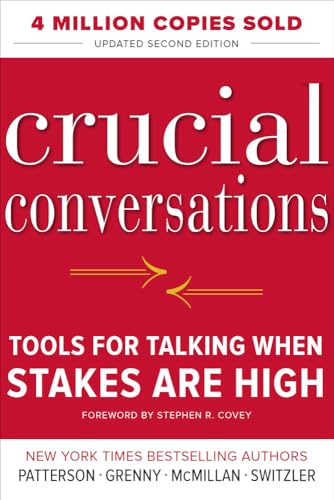 We are taking a group of 12 people through this book, and it is excellent. My husband and I are both trained mediators through Peacemaker Ministries, and this augments the peacemaking process so beautifully. It helps one learn to see when a conversation becomes crucial (opinions vary, stakes are high, and emotions run strong), creating an environment of safety so that those involved can contribute to the "Pool of Shared Meaning." I am excited to apply its principles. I am committed to improving the way I communicate with people!
We are taking a group of 12 people through this book, and it is excellent. My husband and I are both trained mediators through Peacemaker Ministries, and this augments the peacemaking process so beautifully. It helps one learn to see when a conversation becomes crucial (opinions vary, stakes are high, and emotions run strong), creating an environment of safety so that those involved can contribute to the "Pool of Shared Meaning." I am excited to apply its principles. I am committed to improving the way I communicate with people!It is a lovely book, and I highly recommend it.
Here are a few quotes:
Speak when you are angry and you will make the best speech you will ever regret. —AMBROSE BIERCE (p.33)
The best at dialogue do something completely different. They aren’t held hostage by their emotions, nor do they try to hide or suppress them. Instead, they act on their emotions . That is, when they have strong feelings, they influence (and often change) their emotions by thinking them out. As a result, they choose their emotions, and by so doing, make it possible to choose behaviors that create better results. (p.106-107)
With experience and maturity we learn to worry less about others’ intent and more about the effect others’ actions are having on us. No longer are we in the game of rooting out unhealthy motives. And here’s the good news. When we reflect on alternative motives, not only do we soften our emotions, but equally important, we relax our absolute certainty long enough to allow for dialogue— the only reliable way of discovering others’ genuine motives. (p.124-125)
As our emotions kick in, our ideas no longer flow smoothly and gently into the pool. Instead, our thoughts shoot out of our mouths like water out of a raging fire hydrant. And guess what ? Others become defensive. When this happens, when our emotions turn our ideas into a harsh and painful stream of thoughts, our honest passion kills the argument rather than supports it. (pp. 152-153).

No comments:
Post a Comment